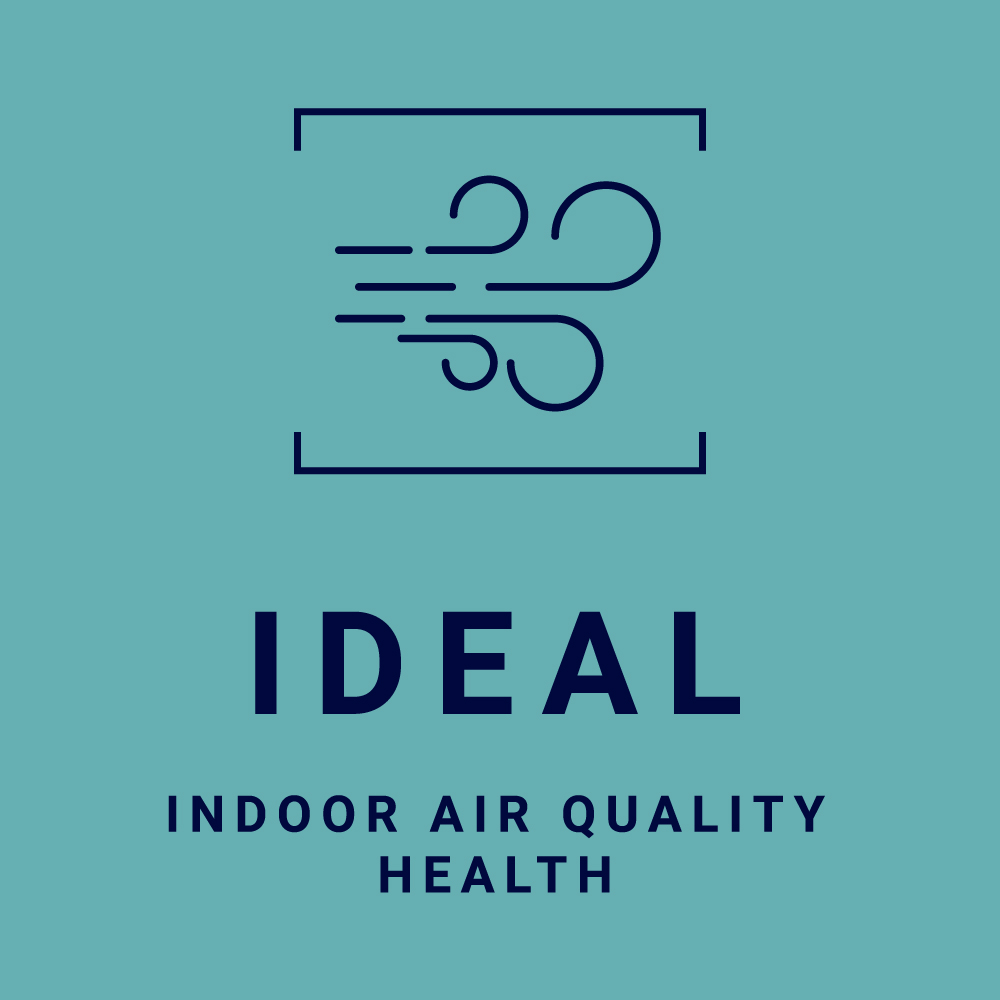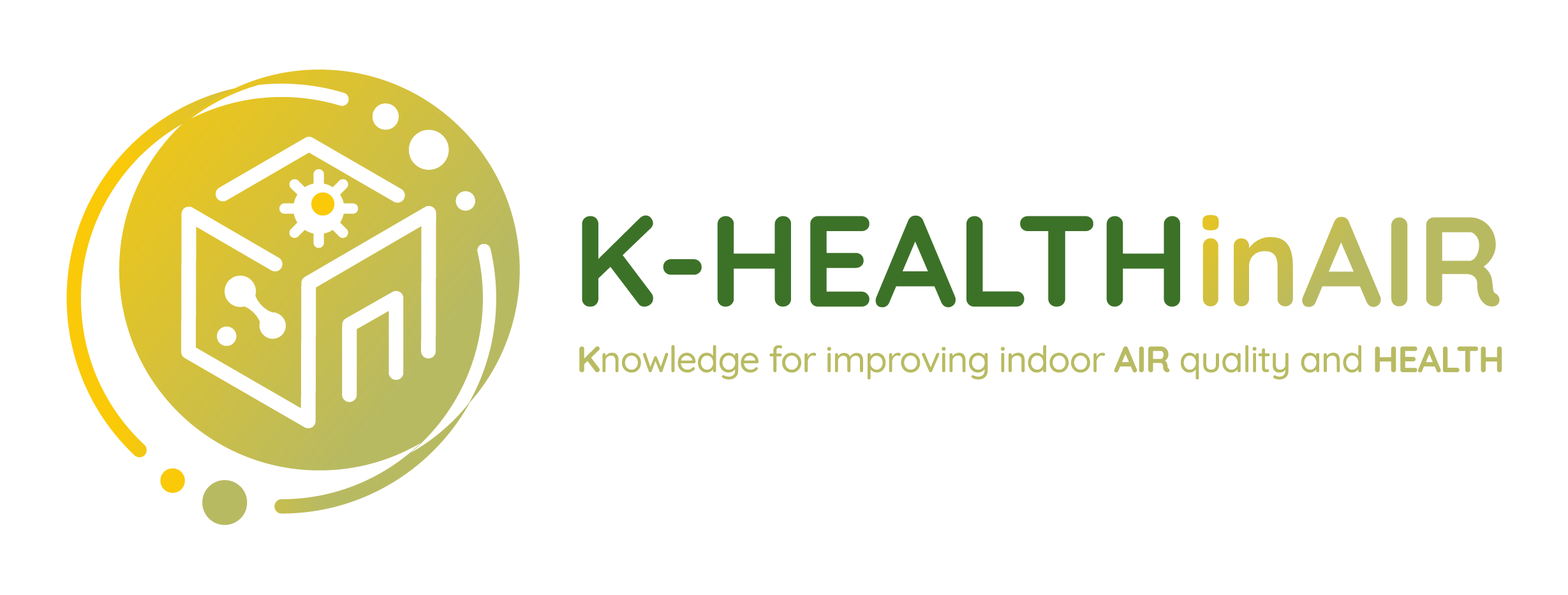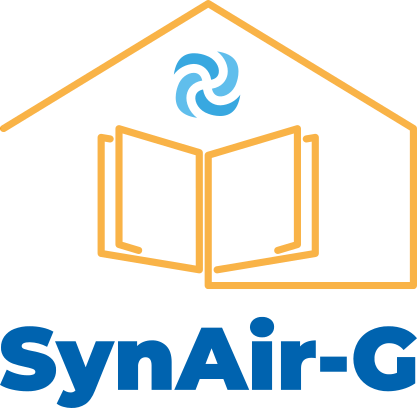PROJECTS
CLUSTER IDEAL is composed by 7 EU funded projects in the topic of Indoor Air Quality and Health. More than 100 organizations participating in the CLUSTER IDEAL activities. Find more information about the projects.
K-HEALTHinAIR
Knowledge for improving indoor air quality and health
K-HEALTHinAIR is an interdisciplinary research project that aims to increase knowledge about chemical and biological indoor air pollutants affecting human health, and to provide solutions for more accurate monitoring and improvement of indoor air quality.
The project will leverage on a novel artificial intelligence algorithm and advanced data analysis to identify the determinants, their sources, and the potential health risks of indoor air quality.
A rigorous research action based on data collected through real-life scenarios, public health surveillance, and particularly vulnerable groups such as high-risk outpatients, elderly people, pregnant women, and children, will investigate the holistic correlations between indoor air quality characterization and its harmful effects on health.
SynAir-G
Disrupting Noxious Synergies of Indoor Air Pollutants and their Impact on Childhood Health and Wellbeing
SynAir-G aims to reveal and quantify synergistic interactions between different pollutants affecting health, from mechanisms to real-life, focusing on the school setting. We will develop a comprehensive and responsive multipollutant monitoring system, advance environmentally friendly interventions, and disseminate the generated knowledge to relevant stakeholders in accessible and actionable formats. To achieve these objectives, SynAir-G will develop novel and improved sensors of chemical and biological pollutants. These will be tested in a real-world setting and eventually combined into a multisensing platform. Pollutants will be linked to their sources and eco-friendly air-purifying devices will be assessed. Health outcome data will be obtained. Highly susceptible children, living with allergy or asthma, will act as sentinels to increase sensitivity of the system, that will be able to provide stratified alerts. Explainable AI will support the near-real time analysis and response. In parallel, cell and mouse models will evaluate the mechanisms and complex dose-responses of the synergistic parameters. SynAir-G will thus provide FAIR data on air pollutants and their sources, a comprehensive and personalized user-friendly solution to monitor indoor air quality, proposals for possible interventions and an improved regulatory framework.
LEARN
Evaluation on indoor air quality for children around europe
LEARNing about the status of air quality in schools and its impact on the cognition of children is a major cornerstone in LEARN. Aiming to overcome the barriers of the currently existing technologies and take a bold step towards developing and deploying novel sensors to detect the presence of possibly harmful air pollutants such as volatile organic compounds and ultrafine particles, LEARN will measure and characterize indoor and outdoor air pollutants and evaluate the presence of biomarkers of exposure and their effect on children´s cognition while trying to recapitulate those effects using C.elegans as a biosensor. Advanced human-based in vitro models of lung and skin coupled with a revolutionary multi-sensing device will be used to investigate their mechanisms of toxicity in real time. Novel remediation strategies will be explored to improve air quality and promote children´s quality of life and life expectancy. The consortium is composed of leading research teams, unrivalled in their fields (environmental epidemiologists, toxicologists, air quality specialists, systems biology, engineers, and citizen/social scientists). The scientific achievements expected to result from LEARN will unlock a large technology potential in IAQ for decades to come, leading to disruptive societal and economic impacts steaming from a radical improvement in the quality of life of children in Europe. LEARN is part of the European cluster on indoor air quality and health.
TWINAIR
Indoor air quality for healthy living
TwinAIR aims to improve urban life by tackling the challenge of indoor air quality (IAQ) improvement by understating its complex interrelationship with external factors. This is achieved by introducing a novel set of tools for identifying sources and tracing a variety of pollutants and pathogens, for enhancing understanding of their effects and assessing their impact on health, for controlling building management systems and services in ways that mitigate part of the impacts and for helping citizens to develop better insights into pollution impacts, along with encouraging healthier, more sustainable choices. TwinAIR embraces bleeding edge innovation in urban sensing (chemical and environmental sensors), data analytics and visualisation (digital maps and real-time video analysis), smart buildings (digital twins and virtual sensors) and behavioural insights (citizen participation, gamification) to deliver a nascent solution. It is implemented across six diverse pilot sites in Europe (Spain, Ireland, United Kingdom, Sweden, German, Greece) with demonstrations covering residential dwellings, public administration buildings, hospitals and schools, along with selected types of vehicles (buses, vans). TwinAIR toolsets will empower students and their parents, commuters, workers and residents to make more healthaware personal decisions about their everyday mobility options and use of indoor spaces, through access to insightful analytics and engaging visualisations of their data, as well as by their participation in educational events and activities. At the same time, it will provide rich evidence to transport planners, facility managers and policymakers about factors influencing IAQ and effective interventions for mitigating its effects on health and wellbeing. By democratising cutting edge innovation in sensors, digital twinning and visual analytics, TwinAIR will enable better decision-making about future mobility policies, built environment management and incentivisation of citizens.
InChildHealth
Identifying determinants for indoor air quality and their health impact in environments for children: measures to improve indoor air quality and reduce disease burdens
InChildHealth will converge in a scientifically based, versatile Integrated Risk Assessment Tool, which will provide information on the interactions between the sources, emissions, concentrations, exposure, body and disease burden for environments occupied by children. Its findings will be disseminated as guidelines, recommendations and training material partly developed with children and teachers in a citizen science approach. In addition, we will develop user-friendly and low-cost monitoring technologies and both technical and behavioural measures to improve IAQ and reduce disease burdens.
Inquire
Identification of chemical and biological determinants, their sources, and strategies to promote healthier homes in Europe
INQUIRE is committed to investigating the impact of chemical and biological factors on indoor air quality and developing strategies to promote healthier homes across Europe. By understanding the origins of pollutants and advocating for improved indoor environments, INQUIRE aims to enhance the well-being of individuals and communities. The attainment of zero pollution in homes offers numerous health benefits for all Europeans, with a specific emphasis on safeguarding the well-being of children. To accomplish this objective, INQUIRE provides comprehensive knowledge, tools, and measures to significantly enhance indoor air quality. Extensive research will be conducted to examine hazardous determinants, their sources, risk factors, and effects, with a particular focus on infants and young children up to the age of 5. The research will involve non-invasive sampling and monitoring of over 200 homes in eight countries over a one-month period. The findings will inform evidence-based recommendations and support the implementation of beneficial measures by industry and policymakers.
EDIAQI
Evidence-Driven Indoor Air Quality Improvement
EDIAQI, or Evidence-Driven Indoor Air Quality Improvement will create healthier, more inclusive and safer living environments in European cities and regions. It will achieve this by validating user-friendly Indoor Air Quality monitoring solutions, through a series of 4 pilots and 4 campaigns, that can help create a long-term Europe-wide knowledge base for risk factors associated with known and emerging indoor air pollutants. The project will collect data on and characterize the main sources, routes of exposure and dispersion of chemical, biological, and emerging indoor air pollutants. The EDIAQI team will also investigate associations between indoor air quality and early-life disease.
The evidence provided will help support relevant stakeholders to develop standardized guidelines for interventions to improve Indoor Air Quality policymakers in reviewing standards and supporting measures for regulation, control and monitoring.







